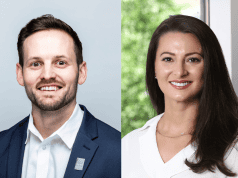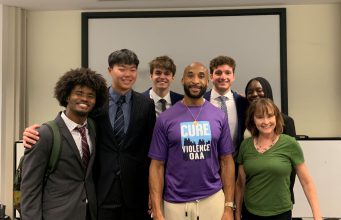Goizueta alumni hold more than a coveted degree from Emory; they also boast a wealth of life experiences and business know-how. In this ongoing series, EmoryBusiness.com will share their sage advice and perspectives, which you can add to your own toolkit.

Patrick McBride 14BBA
Director, IT, Logistics
Gap Inc., Atlanta, GA
Explain your job title: What is a director of IT logistics?
I oversee our end-to-end fulfillment network—from the software that tracks inventory in our building to the AI-powered robotic pick arms that grab items, scan them and get them to their final destinations without a human touch.
Your BBA is in information systems & operations management. How did you learn about a job like the one you have now?
After graduation from Goizueta, I got a job with retail consultancy Kurt Salmon right out of school (shortly after, Kurt Salmon was acquired by Accenture). In that role, I learned the modeling and strategy side, but with operational insight. That type of background is super dense in supply chain. While I had no educational background in technology, I had a personal interest in it. I learned the lingo, the process and the ideology so I could be the bridge, that connection between IT and the business.
What is an accomplishment you’re most proud of?
In the past year I was part of a team that implemented paperless invoicing across all Gap Inc. brands. About two years ago, when I was with Accenture and working on the Gap account, we looked at supply chain technology and the use of paper invoices. Not only do paper invoices harm the environment, they cost a lot of money and time. We asked: Do we really need paper invoices?
We defined a pain point and an alternative way to solve it. We resolved an end-to-end revitalization of the post-purchase life cycle—what should or shouldn’t consumers expect in their package? We started to print information on the plastic poly bags (that items are wrapped in). We added bar codes to the shipping labels to make in-store returns easier. As a result, annually, Gap has taken 61 million pieces of paper out of circulation. And it’s not just the environmental impact I’m proud of. It also saves four seconds of an associate’s time that can be used to deploy more value for Gap and for our customers. When you think of how many associates there are, it’s significant.
What does success look like to you?
It’s different if I look at my life versus my job. In my current role, it’s making a marked improvement for my business partners at the end of the day—helping accomplish what the business wants to achieve—x, y and z. In life, success is about personal fulfillment. Friends and family—seeing what’s important on a micro and macro level. It’s not about judging success by a strict key performance indicator, KPI.
Do you have a memory of business school that sticks out?
I have a couple. Dr. Stephen Nowicki’s Psychology of Leadership class was a huge bright spot. It forced me to dig deeper into self-awareness and interpersonal relationship awareness and to think about how you master that. How you take in information from the people around you and what you do with it. How being more aware helps you in business situations or any time, any place, in any situation. Learning about those soft skills.
When you compound that with the life experience I got in college—chairing the 2013 UBSLC, dealing with different stakeholders, working with others, putting the programming together—it really parallels to the real world. And being president of the BBA Council my senior year. Having to deal with the varied needs and desires of that group as well as with our position within greater Emory—jockeying for more money and learning how to cohabitate. I wouldn’t trade those experiences for the world.
Do you have any advice for current students?
Manage up [do what you can to make your boss’ job easier by managing him or her]. It’s a concept you can bring into your college career as well as your professional career. In school, it can seem like a burden to go see your advisor three times a year. But define what you want to get out of it. Manage up. It can translate into finding a job. Managing up can help Jane Hershman and her team in the BBA Career Management Center do more for you with their incredible pool of resources.
I say “Manage up” with conviction now, but when I was in college, I wasn’t managing up. Not to the extent I am today. As a concept, it’s uncomfortable. Owning your own progress is inherently uncomfortable. I’m not regretful, but I wish I’d known five years ago that college is not too early to manage what’s available to you in order to achieve your goals.
Speaking of goals—what are some of yours?
Professionally, I want to expand the scope of my capabilities. At this point in my career, in the short term, I’d like to learn more horizontally before fine-tuning going vertically. Something like working on the [Gap Inc.] website for a while or going and operating the business from the supply chain perspective. Make a lateral move and broaden my knowledge base.
Personally, I want to read more. I find myself becoming so busy that I haven’t made it through a single book this year. Even when I was in college, there was a lack of intellectual maturity—not from school, but in terms of life lessons. Reading the newspaper, discussing current events with people—I want to move that muscle more.
What are some of your interests outside of work?
I love exploring the ever-evolving Atlanta food scene with my friends. I love traveling—even with consulting. I spent a month and a half in the U.K. back when I was with Gap. I spent a year and a half in Santiago, Chile with Accenture. I love exploring new cultures—solo and with a group. Just get out and go.











